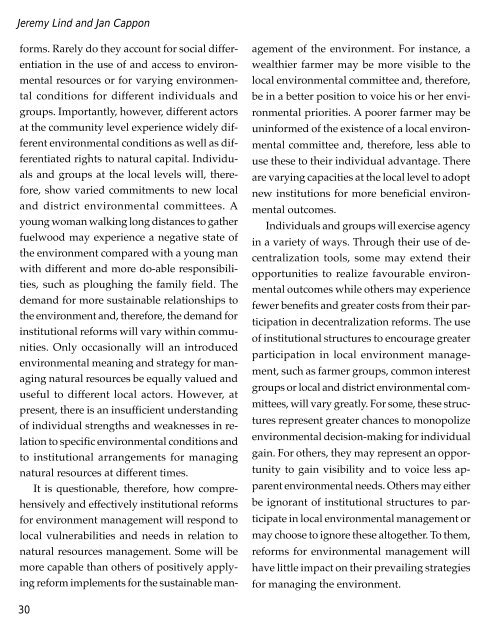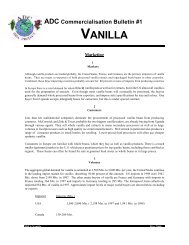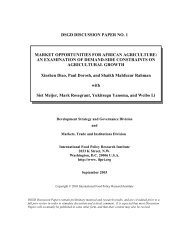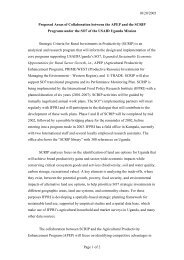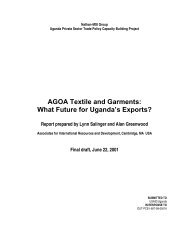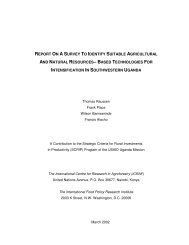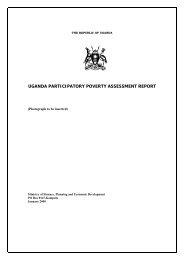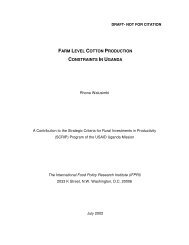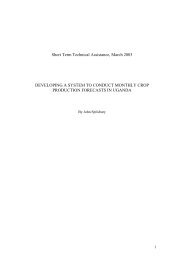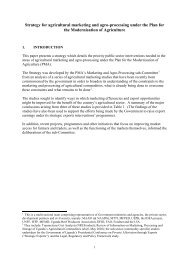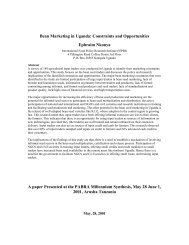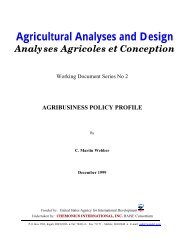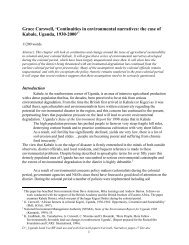Decentralisation in Uganda Rhetoric-Chapter3. - Foodnet
Decentralisation in Uganda Rhetoric-Chapter3. - Foodnet
Decentralisation in Uganda Rhetoric-Chapter3. - Foodnet
Create successful ePaper yourself
Turn your PDF publications into a flip-book with our unique Google optimized e-Paper software.
Jeremy L<strong>in</strong>d and Jan Cappon<br />
forms. Rarely do they account for social differentiation<br />
<strong>in</strong> the use of and access to environmental<br />
resources or for vary<strong>in</strong>g environmental<br />
conditions for different <strong>in</strong>dividuals and<br />
groups. Importantly, however, different actors<br />
at the community level experience widely different<br />
environmental conditions as well as differentiated<br />
rights to natural capital. Individuals<br />
and groups at the local levels will, therefore,<br />
show varied commitments to new local<br />
and district environmental committees. A<br />
young woman walk<strong>in</strong>g long distances to gather<br />
fuelwood may experience a negative state of<br />
the environment compared with a young man<br />
with different and more do-able responsibilities,<br />
such as plough<strong>in</strong>g the family field. The<br />
demand for more susta<strong>in</strong>able relationships to<br />
the environment and, therefore, the demand for<br />
<strong>in</strong>stitutional reforms will vary with<strong>in</strong> communities.<br />
Only occasionally will an <strong>in</strong>troduced<br />
environmental mean<strong>in</strong>g and strategy for manag<strong>in</strong>g<br />
natural resources be equally valued and<br />
useful to different local actors. However, at<br />
present, there is an <strong>in</strong>sufficient understand<strong>in</strong>g<br />
of <strong>in</strong>dividual strengths and weaknesses <strong>in</strong> relation<br />
to specific environmental conditions and<br />
to <strong>in</strong>stitutional arrangements for manag<strong>in</strong>g<br />
natural resources at different times.<br />
It is questionable, therefore, how comprehensively<br />
and effectively <strong>in</strong>stitutional reforms<br />
for environment management will respond to<br />
local vulnerabilities and needs <strong>in</strong> relation to<br />
natural resources management. Some will be<br />
more capable than others of positively apply<strong>in</strong>g<br />
reform implements for the susta<strong>in</strong>able man-<br />
30<br />
agement of the environment. For <strong>in</strong>stance, a<br />
wealthier farmer may be more visible to the<br />
local environmental committee and, therefore,<br />
be <strong>in</strong> a better position to voice his or her environmental<br />
priorities. A poorer farmer may be<br />
un<strong>in</strong>formed of the existence of a local environmental<br />
committee and, therefore, less able to<br />
use these to their <strong>in</strong>dividual advantage. There<br />
are vary<strong>in</strong>g capacities at the local level to adopt<br />
new <strong>in</strong>stitutions for more beneficial environmental<br />
outcomes.<br />
Individuals and groups will exercise agency<br />
<strong>in</strong> a variety of ways. Through their use of decentralization<br />
tools, some may extend their<br />
opportunities to realize favourable environmental<br />
outcomes while others may experience<br />
fewer benefits and greater costs from their participation<br />
<strong>in</strong> decentralization reforms. The use<br />
of <strong>in</strong>stitutional structures to encourage greater<br />
participation <strong>in</strong> local environment management,<br />
such as farmer groups, common <strong>in</strong>terest<br />
groups or local and district environmental committees,<br />
will vary greatly. For some, these structures<br />
represent greater chances to monopolize<br />
environmental decision-mak<strong>in</strong>g for <strong>in</strong>dividual<br />
ga<strong>in</strong>. For others, they may represent an opportunity<br />
to ga<strong>in</strong> visibility and to voice less apparent<br />
environmental needs. Others may either<br />
be ignorant of <strong>in</strong>stitutional structures to participate<br />
<strong>in</strong> local environmental management or<br />
may choose to ignore these altogether. To them,<br />
reforms for environmental management will<br />
have little impact on their prevail<strong>in</strong>g strategies<br />
for manag<strong>in</strong>g the environment.


